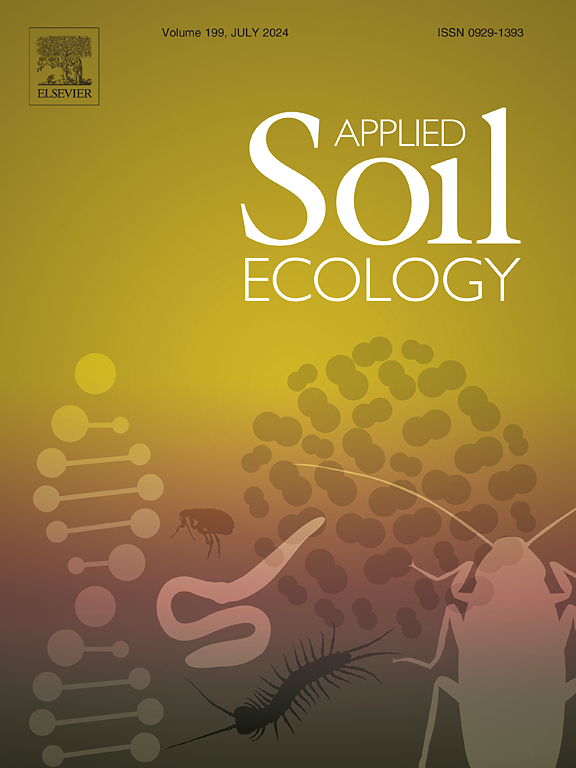Harnessing AMF for tetracycline pollution remediation: Insights from the remodeling of hyphosphere soil bacterial communities
IF 5
2区 农林科学
Q1 SOIL SCIENCE
引用次数: 0
Abstract
Tetracycline (TC) is effectively used antibiotic in animal husbandry and healthcare, has damaged soil ecosystems due to its misuse and residues in the soil environment. Therefore, the main objective of this study was to abate TC in hyphosphere soil by inoculating soil with arbuscular mycorrhizal fungi (AMF) and to explore its potential mechanisms. The results showed that under TC stress, inoculation with AMF reduced the contents of soil organic carbon and total nitrogen, and increased the activities of β-glucosidase and urease in hyphosphere soil. The relative abundance of bacterial genera such as Pseudomaricurvus in the hyphosphere soil increased significantly after AMF inoculation. In addition, four bacterial genera, Cellulosimicrobium, Roseibium, Citromicrobium, and Hephaestia, were uniquely present in AMF-inoculated soil, and the functional genes Unigene456231 and Unigene565663 were significantly enriched in the hyphosphere soil. This suggests that the reshaping of the bacterial community and the enrichment of functional genes in the hyphosphere soil led to changes in the bacterial community’s functions, which promoted the gradual abatement of residual TC in the soil. It should be noted that this study was solely based on a single pot experiment, and its conclusions may have certain limitations in broader ecological application scenarios. Subsequent studies will further investigate the remediation effects under different environmental factors and field trials. This study provides new insights into the use of AMF as a biological agent for the remediation of TC-contaminated soils, offering new perspectives for promoting sustainable agricultural development.

利用AMF进行四环素污染修复:来自土壤细菌群落重塑的见解
四环素(四环素)是一种在畜牧业和卫生保健中得到有效应用的抗生素,由于其误用和在土壤环境中的残留,对土壤生态系统造成了破坏。因此,本研究的主要目的是通过在土壤中接种丛枝菌根真菌(AMF)来减少土壤中的TC,并探讨其可能的机制。结果表明,在TC胁迫下,接种AMF降低了土壤有机碳和全氮含量,提高了土壤β-葡萄糖苷酶和脲酶活性。接种AMF后,土壤中假马尔弧菌属等细菌的相对丰度显著增加。此外,在amf接种的土壤中,纤维素微生物属(Cellulosimicrobium)、玫瑰微生物属(Roseibium)、柠檬酸微生物属(Citromicrobium)和肝菌属(Hephaestia) 4个细菌属均有独特的存在,功能基因Unigene456231和Unigene565663在土壤中显著富集。这说明土壤中细菌群落的重塑和功能基因的富集导致了细菌群落功能的改变,从而促进了土壤中残留TC的逐渐减少。需要指出的是,本研究仅基于单盆试验,其结论在更广泛的生态应用场景中可能存在一定局限性。后续研究将进一步探讨不同环境因素和田间试验下的修复效果。本研究为利用AMF作为生物制剂修复tc污染土壤提供了新的见解,为促进农业可持续发展提供了新的视角。
本文章由计算机程序翻译,如有差异,请以英文原文为准。
求助全文
约1分钟内获得全文
求助全文
来源期刊

Applied Soil Ecology
农林科学-土壤科学
CiteScore
9.70
自引率
4.20%
发文量
363
审稿时长
5.3 months
期刊介绍:
Applied Soil Ecology addresses the role of soil organisms and their interactions in relation to: sustainability and productivity, nutrient cycling and other soil processes, the maintenance of soil functions, the impact of human activities on soil ecosystems and bio(techno)logical control of soil-inhabiting pests, diseases and weeds.
 求助内容:
求助内容: 应助结果提醒方式:
应助结果提醒方式:


